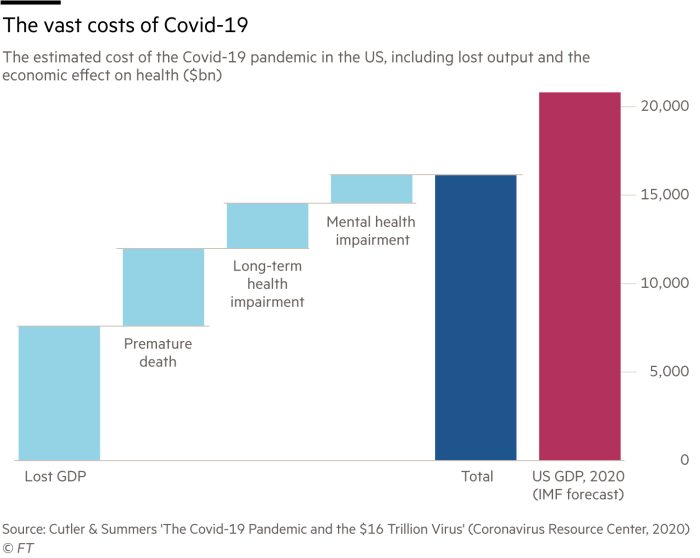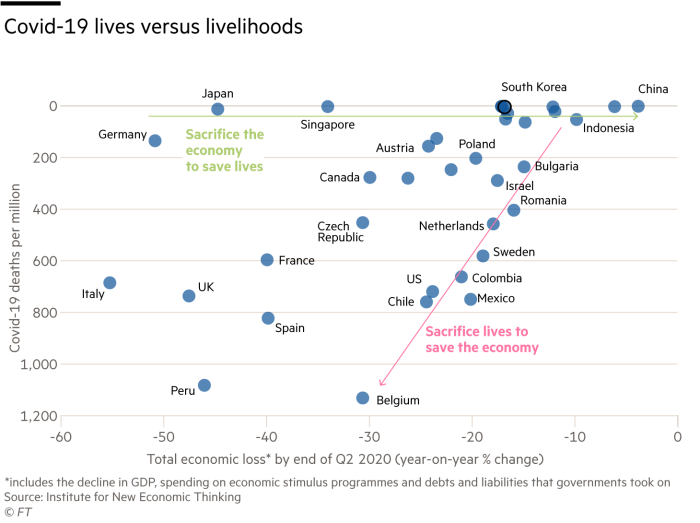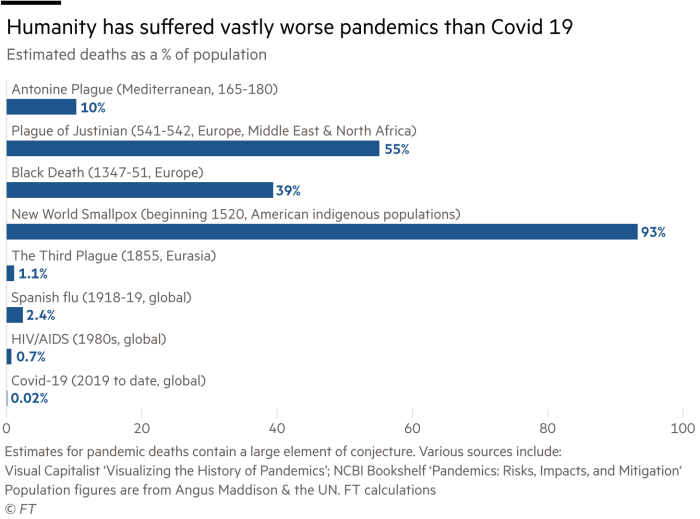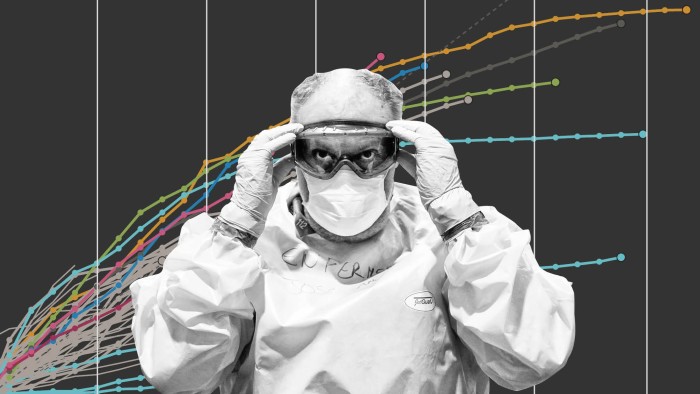What the world can learn from the Covid-19 pandemic


Simply sign up to the Coronavirus economic impact myFT Digest -- delivered directly to your inbox.
The most important single thing we have learnt from Covid-19 is how much damage may be done by a relatively mild pandemic by long-term historical standards. To call it mild is not to belittle the suffering it has caused, and will continue to cause, before an effective vaccination programme is rolled out and sustained globally. But Covid-19 has demonstrated a social and economic vulnerability far greater than experts imagined. It is important to understand why this is the case and learn how to manage the impact of such diseases better in future.
In a recent paper, David Cutler and Lawrence Summers of Harvard estimate the total cost of Covid-19 to the US alone at $16tn. This amounts to 75 per cent of a year’s US gross domestic product. Almost half of this is the cumulative value of lost GDP estimated by the non-partisan Congressional Budget Office. The rest is the cost of premature death and impairment of physical and mental health, according to values customarily used for the world’s richest big economy. The total cost is, they judge, four times that of the recession after the 2008 financial crisis. If the cost to the world were also to be 75 per cent of annual GDP, it would be around $96tn, at purchasing power parity exchange rates. That is almost certainly an overestimate. Nevertheless, the cost is huge.

So far, the global death toll of Covid-19 is estimated at 1.4m. Deaths are now running at a little under 10,000 a day or about 3.5m a year. If this were maintained, cumulative deaths over the first two years might reach close to 5m, or just over 0.06 per cent of the global population. To put this in context, the Spanish flu, which emerged in 1918, lasted 26 months and cost somewhere between 17m and 100m lives, or between 1 and 6 per cent of the then global population. A comparable death toll for Covid-19 today would be between 80m and more than 400m. Some pandemics, notably the Black Death in the 14th century, have been far more lethal even than Spanish flu.
A 2006 report from the CBO argued that “a pandemic involving a highly virulent flu strain (such as the one that caused the pandemic in 1918) could produce a short-run impact on the worldwide economy similar in depth and duration to that of an average postwar recession in the US”. But Spanish flu killed about 675,000 Americans out of the then population of just 103m. That is equivalent to over 2m today. If the CBO had been right, the economic impact of this pandemic should have been vastly smaller than it has been.

A similar study for the EU Commission, also published in 2006, concluded that “although a pandemic would take a huge toll in human suffering, it would most likely not be a severe threat to the European macroeconomy”. That conclusion was quite wrong.
Why, then, has the economic damage of such a comparatively mild pandemic been so huge? The answer is: because it could be. Prosperous people can easily dispense with a large proportion of their normal daily expenditures, while their governments can support affected people and businesses on a huge scale. This is also what people expect from governments. The response to the pandemic is a reflection of economic possibilities and social values today, at least in rich countries. We are prepared to pay a vast price to contain pandemics. And we can do so far better than before.

Some argue that the methods chosen, notably undiscriminating lockdowns, have been largely responsible for these huge economic costs. Instead, they suggest, the disease (and so the ill) should have been allowed to roam freely, while seeking to shield only the vulnerable.
This is very questionable. One reason is that the higher the incidence of the disease, the more people will be determined to shield themselves, a point made in the IMF’s latest World Economic Outlook.

Actual experience, as opposed to cost-benefit analyses of theoretical alternatives, further strengthens the case for suppressing the disease fully, where feasible. A recent paper from the Institute for New Economic Thinking, To Save the Economy, Save the People First, suggests why. A chart (reproduced here) shows that countries have followed two strategies: suppression, or trading off deaths against the economy. By and large, the former group has done better in both respects. Meanwhile, countries that have sacrificed lives have tended to end up with high mortality and economic costs.
Now, amid a second wave of infections and lockdowns in Europe, the failure to persist until they achieved full control over the virus in the first wave looks a big mistake. Of course, effective testing, tracing and quarantining would be better still. But that is impossible if infection rates are close to recent levels.

We still have a great deal to learn from Covid-19, and we must do so, because the next pandemic could be far more lethal than this one. In the meantime, we must seek to escape from the current disaster as well and as quickly as possible. This will need a high level of global co-operation. While the costs of the pandemic have been quite extraordinary, so, happily, has been the scientific response. Now vaccines must be produced and distributed across the world. An important step is for all countries, including the US, to join Covax, the initiative to provide vaccines worldwide. Global challenges need global solutions.
Covid-19 has been a far more devastating economic shock than economists expected. This is a huge lesson. An even more virulent disease is perfectly conceivable. Next time, we must suppress the new disease far more quickly. Many now prate about freedom. But the people’s safety should remain the supreme law of politics, now and forever.
Follow Martin Wolf with myFT and on Twitter
Latest coronavirus news

Follow FT's live coverage and analysis of the global pandemic and the rapidly evolving economic crisis here.
Letters in response to this column:
Antipathy to Friedman is fuelling ethical investment / From Peter Hulsroj, Hornbaek, Denmark
A libertarian paradise we could well do without / From Ian MacKillop, Ilminster, Somerset, UK
Terrified politicians have overreacted to the virus / From Jamie Sandison, Norwalk, CT, US
Comments